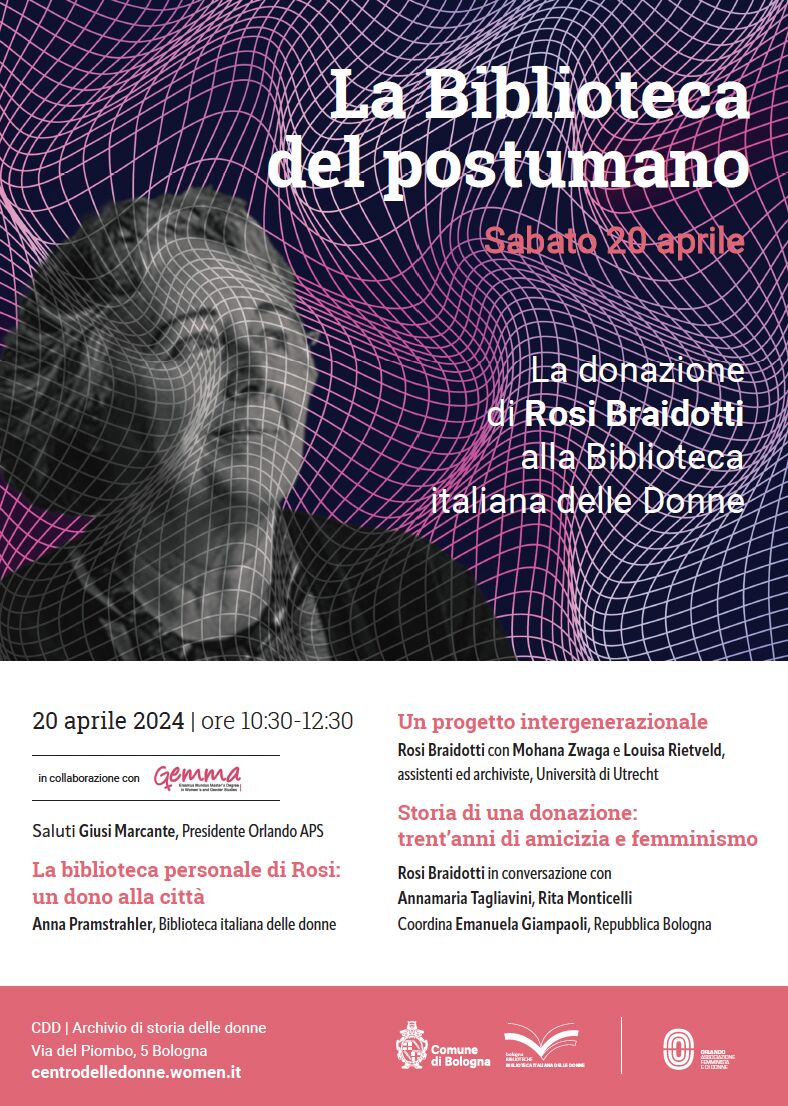Door Team Braidotti
“l’ottimismo degli algoritme ‘Sarà la tecnologia a liberarci’ .”
“Ich halte das westliche Denken für überholt” Interview in Die Zeit
“Oude muziek is niet sacraal, Bach was ook geen heilige” Interview in NRC Handelsblad
“Boegbeeld Vrouwenstudies: Ik wil een goede voorouder zijn” Interview in Trouw
“Zwölf Ideen für eine bessere Zukunft” Interview in Die Zeit
Il femminismo spiegato alle migranti (e alle ragazze)
Review: The Nomadic Humanities by Catharine R. Stimpson
Read “The Nomadic Humanities” by Catharine R. Stimpson in the Los Angelos Review of Books
July 12, 2016.
Article about Kübra Kizil: winner of ROSANNA Fund for Women
The newssite of Utrecht University, DUB, recently published a wonderful article about a winner of the ROSANNA Fund for Women: Kübra Kizil. As a refugee, she is starting over in the Netherlands. With the help of the funding, she became a Master-student at Utrecht University.
Cologne: Apply for the workshop with Rosi Braidotti: Revisiting “Nomadic Subjects” 30 years later
In the workshop Revisiting Nomadic Subjects – 30 Years Later with philosopher Rosi Braidotti we discuss several chapters from two of her key publications: Posthuman feminism (2022) and Nomadic Subjects – Embodiment and sexual difference in contemporary feminist theory (2011, originally published in 1994).
In her understanding of posthuman feminism, Braidotti works on a redefinition of materialism by stating a closer non-binary connection of Humanities and Life Sciences as well as Natural and Techno sciences. This transversal understanding highlights a shift from the body primacy to the “politic of the body” as interconnected, embodied, embedded, and intersectional. It also comprises ecologies of non-human and non-organic matter and is based on materialist, immanent and realist philosophies such as those by Spinoza, Margulis, Deleuze, Deleuze/Guattari, and indigenous approaches (i.e. Todd, Whyte, Viveiros Castro).
Braidotti’s thinking on nomadic subjects has been influencing discourses since the early 1990s. She introduces the practice of the “as if” by framing nomadic thinking as performative, affective, and as a movement in between languages. This includes processes of repeating, mimicking, and impersonating as a subversive way to open up other agential spaces. With Deleuze/Guattari’s nomadic epistemologies and Foucault’s concept of counter-memory, the nomadic in Braidotti’s philosophy encompasses critical feminist thought of the periphery (such as poverty and injustice) as well as the transit spaces and zones in-between. It also addresses the political as a way of acting on discursive and material aspects of the fractured and hegemonic-resistant subject. Her concept of ‘becoming nomad’ delineates a differentiated spatial and time-based process of ‘becoming subject’: a deconstructive and de-essentialist understanding and acknowledgement of difference from within.
Time and place: Bibliothek Erich Auerbach Institut (3. OG), Weyertal 59 (Rückgebäude), 50937 Köln | 28 May 2024, 10:00-16:00.
Contact
Anton Vogt
Email: avogt15@uni-koeln.de
For the application of the workshop, please email Anton Vogt before 20 May 2024.
Panel discussion in Bologna: La biblioteca del postumano
My team and I had the honour of attending the panel discussions on the importance of archival work and feminist, intergenerational solidarity at celebratory opening of the Braidotti donation to the archive of the Bibliotheca Italia Della Donne in Bologna on April 20th, 2024. It was truly a remarkable event, celebrating the preservation of invaluable archives of feminist thought and scholarship. A heartfelt thank you to the organizers for their dedication and hard work, as well as their many kind words. Grateful for the opportunity to witness the continuation of dialogue and activism, as well as the efforts of creating accessible sources of knowledge and kinship for future generations.
I had the honour of attending the panel discussions on the importance of archival work and feminist, intergenerational solidarity at celebratory opening of the Braidotti donation to the archive of the Bibliotheca Italia Della Donne in Bologna on April 20th, 2024. It was truly a remarkable event, celebrating the preservation of invaluable archives of feminist thought and scholarship. A heartfelt thank you to the organizers for their dedication and hard work, as well as their many kind words. Grateful for the opportunity to witness the continuation of dialogue and activism, as well as the efforts of creating accessible sources of knowledge and kinship for future generations.

